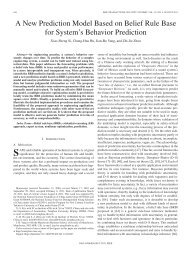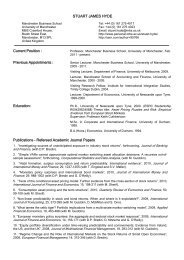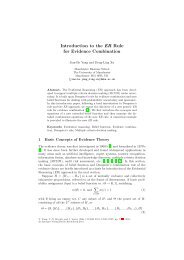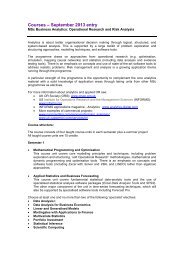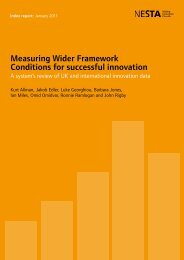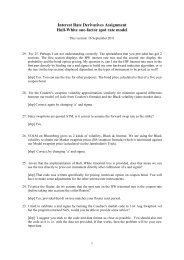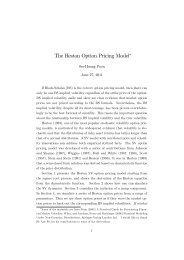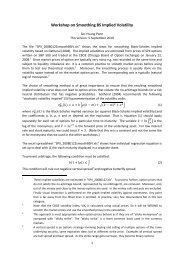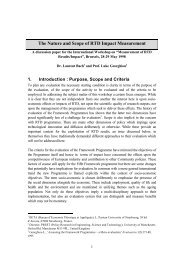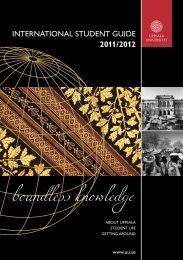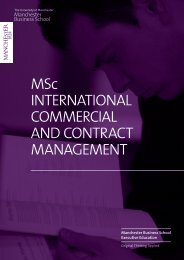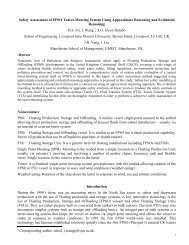Manchester Institute of Innovation Research ANNUAL REPORT ï²ï°ï±ï±
Manchester Institute of Innovation Research ANNUAL REPORT ï²ï°ï±ï±
Manchester Institute of Innovation Research ANNUAL REPORT ï²ï°ï±ï±
You also want an ePaper? Increase the reach of your titles
YUMPU automatically turns print PDFs into web optimized ePapers that Google loves.
Already anticipated by the establishment <strong>of</strong> S.NET in 2009 (The Society for the Study <strong>of</strong><br />
Nanoscience and Emerging Technologies), N&N is increasingly understood as an arena<br />
worthy <strong>of</strong> social science research in its own right, but perhaps more significantly as a<br />
case-example and precedent for the study <strong>of</strong> a broader class <strong>of</strong> emergent technologies<br />
where particular conditions apply. These are conditions which combine fundamental<br />
uncertainty with the ubiquity that comes with pervasive penetration into everyday lives;<br />
production/consumption at industrial scale; impacting across a range <strong>of</strong> sectors and<br />
applications as an enabling or platform technology; and the potential to produce a step<br />
change in broader sweeps <strong>of</strong> technological innovation, productivity and economic<br />
growth. A further condition pertains to the possibilities for public controversy arising<br />
from perceived safety or ethical harm resulting from the development <strong>of</strong> a particular<br />
class <strong>of</strong> technologies potentially creating societal counter-movements <strong>of</strong> various kinds.<br />
These conditions lay the seed-bed for new and alternative interventions in the<br />
governance <strong>of</strong> emerging technologies, such as organised public deliberation and<br />
participation initiatives, the design and introduction <strong>of</strong> new governance instruments such<br />
as Codes <strong>of</strong> Conduct for the responsible development and commercialisation <strong>of</strong> new<br />
technologies; and corporate responsibility and ‘stage-gate’ assessment exercises etc.<br />
Alongside the emergence <strong>of</strong> new technologies we witness new multi-actor experiments<br />
in participatory governance complementing traditional State-regulation and ‘hard’ law<br />
varying significantly from country to country. So, latest and forthcoming rounds <strong>of</strong><br />
technological innovation are increasingly co-developed with innovations in their<br />
governance. Within this contested and negotiated arena <strong>of</strong> governance innovations, we<br />
witness recent shifts in debates and practices. Grand, speculative, future narratives are<br />
less evident. Indeed, the term de-futurisation (Zülsdorf et al 2011)7 captures a research<br />
trend mirroring the reality that, for example, N&N is no longer an object for speculation<br />
as to long-term future impacts, but is entering everyday lives ‘for real’ and ‘for now’.<br />
MIoIR researchers have been pro-active not only in participating, but crucially, in shaping<br />
these debates and research trajectories. Highlights from the engagement and research<br />
activities <strong>of</strong> MIoIR staff in 2011 include:<br />
A strategic collaboration ‘ the <strong>Innovation</strong> Co-Lab’ has been established between the<br />
Georgia <strong>Institute</strong> <strong>of</strong> Technology School <strong>of</strong> Public Policy, Atlanta USA (GT); the Beijing<br />
<strong>Institute</strong> <strong>of</strong> Technology Lab <strong>of</strong> Knowledge Discovery and Data Analysis, Beijing China<br />
(BIT) and the <strong>Manchester</strong> <strong>Institute</strong> <strong>of</strong> <strong>Innovation</strong> <strong>Research</strong> (PI for MIoIR Pr<strong>of</strong>essor<br />
Philip Shapira). The <strong>Innovation</strong> Co-Lab engages researchers in mutually developed<br />
research collaborations, researcher exchanges, training, methodology development<br />
and other related activities in the domain <strong>of</strong> science, technology, and innovation<br />
management and policy. During 2011 a Co-Lab workshop involving senior and junior<br />
researchers from all three institutes took place at MIoIR <strong>Manchester</strong> (20/21 June); and<br />
was followed by a further workshop hosted by GT in Atlanta (12/13 September). Both<br />
workshops were financially supported by the British Council. Co-lab activity covers<br />
collaborative bidding, young researcher forums, short-course provision (policy<br />
evaluation, foresight, advanced quantitative methods), methodological development<br />
7 Zulsdorf, T., Coenen, C., Ferrairi, A., Fiedler, U., Milburn, C., Weinroth, M., (2011) Quantum Engagements: Social<br />
Reflections <strong>of</strong> Nanoscience and Emerging Technologies , Akademische Verlagsgesellschaft AKA GmbH, Hedelberg.<br />
18



